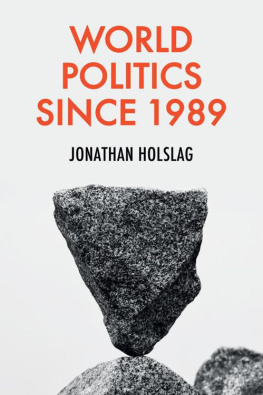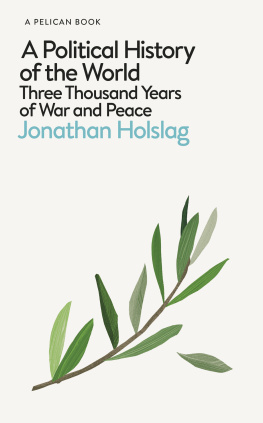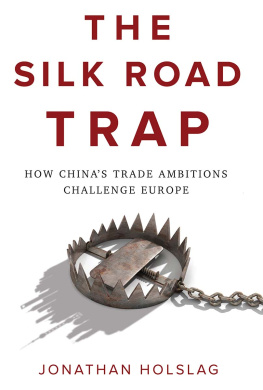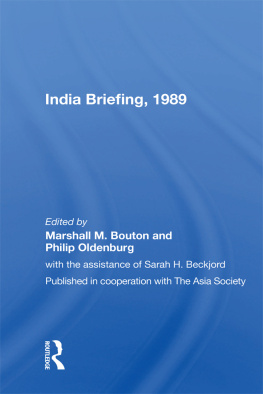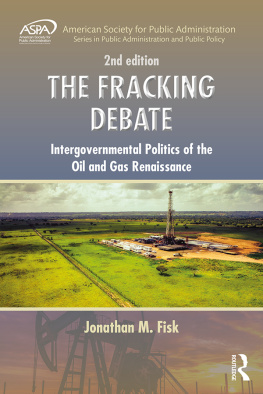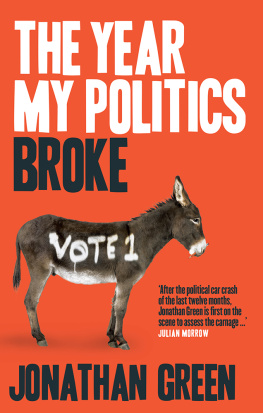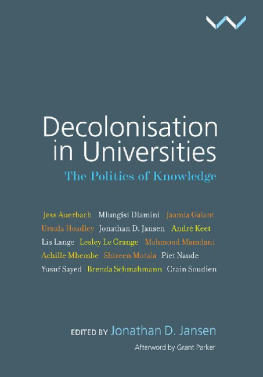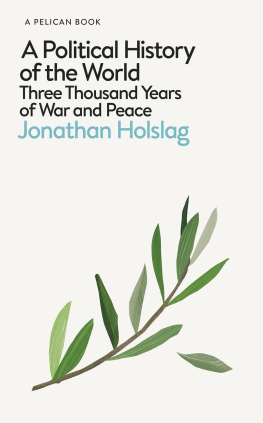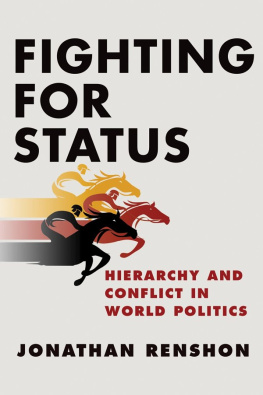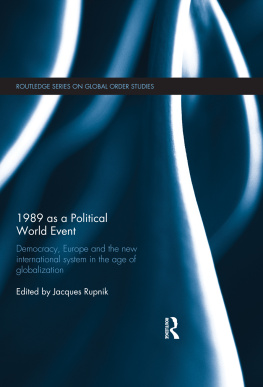Jonathan Holslag - World Politics since 1989
Here you can read online Jonathan Holslag - World Politics since 1989 full text of the book (entire story) in english for free. Download pdf and epub, get meaning, cover and reviews about this ebook. year: 2021, publisher: Polity Press, genre: Politics. Description of the work, (preface) as well as reviews are available. Best literature library LitArk.com created for fans of good reading and offers a wide selection of genres:
Romance novel
Science fiction
Adventure
Detective
Science
History
Home and family
Prose
Art
Politics
Computer
Non-fiction
Religion
Business
Children
Humor
Choose a favorite category and find really read worthwhile books. Enjoy immersion in the world of imagination, feel the emotions of the characters or learn something new for yourself, make an fascinating discovery.
- Book:World Politics since 1989
- Author:
- Publisher:Polity Press
- Genre:
- Year:2021
- Rating:3 / 5
- Favourites:Add to favourites
- Your mark:
- 60
- 1
- 2
- 3
- 4
- 5
World Politics since 1989: summary, description and annotation
We offer to read an annotation, description, summary or preface (depends on what the author of the book "World Politics since 1989" wrote himself). If you haven't found the necessary information about the book — write in the comments, we will try to find it.
World Politics since 1989 — read online for free the complete book (whole text) full work
Below is the text of the book, divided by pages. System saving the place of the last page read, allows you to conveniently read the book "World Politics since 1989" online for free, without having to search again every time where you left off. Put a bookmark, and you can go to the page where you finished reading at any time.
Font size:
Interval:
Bookmark:
- Chapter 1
- Chapter 2
- Chapter 7
- Chapter 8
- Chapter 9
- Chapter 13
- Chapter 2
- Chapter 3
- Chapter 1
Important and timely.
James Appathurai, Deputy Assistant Secretary General for Political Affairs and Security Policy, NATO
This is an utterly fascinating, carefully argued and lucidly drafted analysis of the current global circumstances. Holslag provides a deft, informed and multifaceted argument to explain how the highly optimistic views of the future of world politics failed to materialize after the end of the Cold War.
Sumit Ganguly, Indiana University
Rich and comprehensive, Jonathan Holslags book takes readers on a journey of discovery through the major changes in world politics over the past three decades. I will be assigning this book for my undergraduate international relations classes.
Kun-Chin Lin, University of Cambridge
This wonderfully written book takes the reader on a fascinating journey through the complexity of the last three decades of world politics. Jonathan Holslag connects the dots of a fragmented and scattered global landscape, offering multiple roads to understanding.
Federica Mogherini, Rector of the College of Europe, Former European High Representative for Foreign Affairs
JONATHAN HOLSLAG
polity
Copyright Jonathan Holslag 2021
The right of Jonathan Holslag to be identified as Author of this Work has been asserted in accordance with the UK Copyright, Designs and Patents Act 1988.
First published in 2021 by Polity Press
Polity Press
65 Bridge Street
Cambridge CB2 1UR, UK
Polity Press
101 Station Landing
Suite 300
Medford, MA 02155, USA
All rights reserved. Except for the quotation of short passages for the purpose of criticism and review, no part of this publication may be reproduced, stored in a retrieval system or transmitted, in any form or by any means, electronic, mechanical, photocopying, recording or otherwise, without the prior permission of the publisher.
ISBN-13: 978-1-5095-4674-9
A catalogue record for this book is available from the British Library.
Library of Congress Cataloging-in-Publication Data
Names: Holslag, Jonathan, author.
Title: World politics since 1989 / Jonathan Holslag.
Description: Cambridge, UK ; Medford, MA : Polity Press, 2021. | Includes bibliographical references and index. | Summary: A brilliant account of how the world squandered the opportunities of the post-Cold War era--Provided by publisher.
Identifiers: LCCN 2020054809 (print) | LCCN 2020054810 (ebook) | ISBN 9781509546725 (hardback) | ISBN 9781509546749 (epub)
Subjects: LCSH: World politics--20th century. | World politics--21st century.
Classification: LCC D443 .H6435 2021 (print) | LCC D443 (ebook) | DDC 909.83/1--dc23
LC record available at https://lccn.loc.gov/2020054809
LC ebook record available at https://lccn.loc.gov/2020054810
The publisher has used its best endeavours to ensure that the URLs for external websites referred to in this book are correct and active at the time of going to press. However, the publisher has no responsibility for the websites and can make no guarantee that a site will remain live or that the content is or will remain appropriate.
Every effort has been made to trace all copyright holders, but if any have been overlooked the publisher will be pleased to include any necessary credits in any subsequent reprint or edition.
For further information on Polity, visit our website: politybooks.com
No society is fortunate when its walls are standing while its morals are in ruins. Scipio
WALLPECKERS, THEY WERE CALLED. IN THE WINTER OF 1989, hundreds of wallpeckers or Mauerspechte descended on the Berlin Wall. Armed with hammers and chisels, they attacked the imposing barrier of concrete and barbed wire. One year later, the entire Iron Curtain between the Soviet Union and the West came down. It was an electric moment. A second heart implanted, wrote a student in her diary, cant breathe any more. From then onwards, the world experienced a period of opening up, of fading political fault lines, diminishing travel restrictions, and lowering barriers against trade. This was the age of globalization, of growing connectivity, commerce, and prosperity, growth that came with the expectation that the remaining vestiges of authoritarianism would make place for freedom.
The high tide of globalization appeared to hold opportunities for all. A teenager asked to name the most urgent challenge facing the world would likely mention pollution or climate change.
If there was competition, it would be a peaceful contest for connectivity, conducted by multinationals and start-up companies instead of states and soldiers. Container ships not aircraft carriers shaped the fortune of the major powers. Cheap airlines made city trips affordable. Internet traffic exploded. Global economic production grew. Extreme poverty retreated. Magazines wrote about a renaissance in Africa. India with its hundreds of millions of paupers was set to shine. Globalization augured a golden era or at least an exit from an era of iron.
But the pendulum swung back. In 2019, people protested again in the shadow of an imposing wall. It was pulled up along thousands of kilometers of border between the United States and Mexico. It was another milestone in world history, a turning point between a period of opening and a new period of fragmenting. The talk of the day was no longer about globalization but about de-globalization, about sovereignty, and autonomy. The United Kingdom decided to leave the European Union. In the United States, President Donald Trump railed against cosmopolitanism. Despite his turbulent term, two impeachment procedures, his blatant nationalism, his failure to address the devastating corona pandemic, and his rude style, Trump narrowly missed a second term during the elections of 2020. Many Americans continued to support him. The center of the global order, the champion of liberal values, the West itself, was cast adrift. Never had it been so fragmented.
All around, nationalism and authoritarianism were on the offense. In democratic India, Hindu-nationalist politicians exploited resentment against a minority of two hundred million Muslims. In South Africa, the legacy of freedom fighter Nelson Mandela was replaced by nationalism and xenophobia. If competition about territory was sometimes seen as trivial, Iraq invaded Kuwait, India clashed with Pakistan and China over Kashmir, Russia annexed Crimea, a strategically located peninsula in the Black Sea, and China went further and further in trying to control its adjacent seas. Numerous other territorial conflicts remained tense. The world moved from wall to wall.
In 2020, a worldwide outbreak of coronavirus accelerated this evolution. The World Health Organization became a battleground between China and the United States, until Washington ended its membership entirely. Highlighting the nationalist tendency, countries like Germany delayed exports of medical equipment. Instead of joining forces, the major powers unleashed a propaganda war. Exposing their increasing weakness, disaster management in countries like Italy and the United Kingdom turned out to be disastrous. In the United States, militia protested against national government measures to halt the virus. Tyrants get the rope, protesters yelled outside the capitol building of the State of Michigan. The coronavirus did not cause the decay of political order. It rather took hold of a political body that was in bad shape. Over one hundred armed groups vowed to fight the return of a Democrat to the White House, his alleged attempt to bring in communism, and his attempt to curtail gun ownership. The defeat of President Donald Trump in the elections made Trumpism more defiant.
Font size:
Interval:
Bookmark:
Similar books «World Politics since 1989»
Look at similar books to World Politics since 1989. We have selected literature similar in name and meaning in the hope of providing readers with more options to find new, interesting, not yet read works.
Discussion, reviews of the book World Politics since 1989 and just readers' own opinions. Leave your comments, write what you think about the work, its meaning or the main characters. Specify what exactly you liked and what you didn't like, and why you think so.

